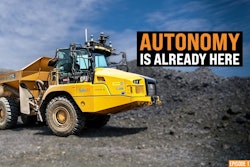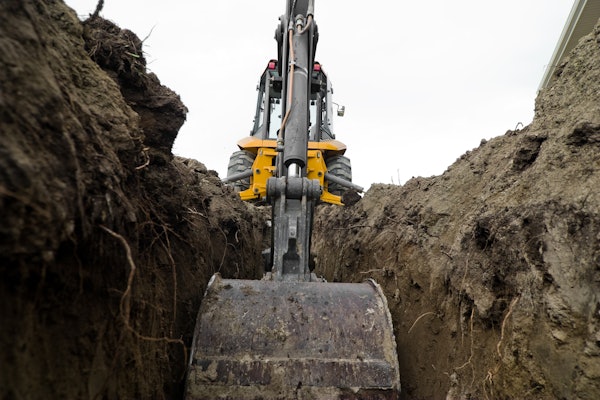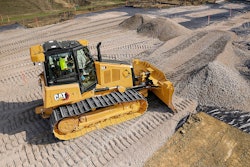Calling and waiting on 811 underground utility location can be frustrating, especially when they’re late and miss lines.
On this episode of The Dirt, we peer behind the scenes of 811 to demystify the process, as well as offer contractors tips on how to handle problems that can occur. Guiding us is the nonprofit Common Ground Alliance’s communications director, Kelly Cahill.
Cahill explains that one of the biggest problems with the 811 system is that contractors are still failing to call 811 before they dig. Not making that phone call is the leading cause of utility-line strikes, representing one-fourth of all damages, she says.
Not only is a utility strike time-consuming and potentially costly for contractors, it can also be deadly.
At the same time, contractors have some legitimate gripes with 811. The service can be slow to arrive, sometimes delaying projects. It only detects the utilities of members of the 811 system, so some, especially lines owned by smaller companies or municipalities, might be missed. There have also been incidents of utilities using predatory practices to claim payment for utility strikes even when those lines were not located by 811.
So if you want to avoid the costs – and dangers – of striking underground utilities, don’t miss this episode of The Dirt.
Equipment World serves up weekly videos on the latest in construction equipment, work trucks and pickup trucks – everything contractors need to get their work done. Subscribe and visit us at equipmentworld.com!
In This Episode:
- 00:00 – Everything You Need to Know About 811
- 00:27 – How Does 811 Work?
- 02:03 – How Does 811 Know Where Utilities Are?
- 02:50 – Why Does 811 Not Know Where Some Utilities Are?
- 03:53 – All Utility Strikes Can Be Dangerous
- 04:36 – Who Sends Out Utility Locators?
- 05:03 – How Often are Utilities Damaged by Contractors?
- 06:21 – Who Accounts for Most Utility Strikes?
- 07:16 – Utilities That Can’t Be Located in Time
- 09:19 – Your Options When Utilities are Not Located in Time
- 12:45 – What Not to Do When Utilities Can’t Be Located in Time
- 14:14 – Letting 811 Know Your Locate Did Not Happen Can Improve the System
- 15:55 – Predatory Utility Bills After a Strike
- 20:01 – How to Fight a Predatory Utility Bill
00:00:00:10 - 00:00:27:04
Bryan Furnace
Today we're here to talk about 811. Who's behind it? What's its purpose and how is everything interconnected? And then how does that trickle down to us on the front lines as we're out in the field? Here to talk about this today is Kelly from Common Ground Alliance.
00:00:27:06 - 00:00:45:00
Bryan Furnace
So 811 is one of these like these pillars of the industry now. But I think a lot of people don't really understand exactly how eight one works. So just at a high level, can you give us an overview of kind of who runs 811 and how the utilities are interconnected and how everything ties together?
00:00:45:02 - 00:01:13:20
Kelly Cahill
Yeah, absolutely. So I'm with the Common Ground Alliance. We are the national association that promotes 811 and the contacts before you dig service. But we do not run the contact before you dig service. we did work with the FCC to get 811 designated as call before you dig all the way back in 2007. So, okay, our members include some of the utilities who you deal with if you're contacting 811 and pipelines.
00:01:13:22 - 00:01:37:09
Kelly Cahill
And also folks like first responders who have to come help when somebody strikes the gas line and things like that. But as I mentioned, we're not the folks who you are connected with. If you pick up the phone to call 811, or if you visit an online ticket entry system. the way that sort of works in the US is pretty much each state has their own 811 centers.
00:01:37:09 - 00:01:57:14
Kelly Cahill
So for example, the Common Ground Alliance is headquartered in Virginia. All of our calls would go to Virginia 811. There are some states, like California that have two different centers, one that serves the northern part of the state, one that serves the southern part. But from the 811-user perspective, you don't have to worry about any of that.
00:01:57:15 - 00:02:27:02
Kelly Cahill
You can call eight one and you will get routed to the appropriate local 811 center. You also asked how utilities are involved, which is really important. utilities essentially pay to be members of 811 centers that cover their jurisdiction. So if you're a big electric company that covers three states, you are paying to be a member of three different state 811 centers, because ultimately those companies want to preserve their own infrastructure.
00:02:27:06 - 00:02:49:12
Kelly Cahill
They have a vested interest from a safety and cost and every other kind of perspective in not having any damages occur on their system. So they pay to fund these 811 centers who deal with kind of the administrative aspect of collecting information about where folks want to dig, and then they also disseminate that information to all affected utilities.
00:02:49:14 - 00:03:12:08
Bryan Furnace
Interesting. So you've actually kind of dispelled one of my curiosities that I've always had as to why all of your major utilities, for the most part, you can, you can have located, but there are some of these smaller utilities that the locating service comes out and they just they don't have that information. I've always wondered why. And so if I'm understanding this correctly, it's because they just aren't a member of the association.
00:03:12:08 - 00:03:18:03
Bryan Furnace
They aren't paying into the 811 system. And as a result, 811 doesn't have information on their infrastructure.
00:03:18:05 - 00:03:47:11
Kelly Cahill
That is correct. So there are some states that require every utility to be a member of the 811 center. And those states have better outcomes when it comes to reducing damages to buried utilities. other states don't. And particularly for small, you know, municipalities who run their own water systems, small electric co-ops, it can be a challenge to do all of the locating that they need to to do or are requested to do.
00:03:47:11 - 00:04:06:16
Kelly Cahill
Unfortunately, we have to find a way to make that happen because it's a huge safety concern, not just for things like gas and electric, that we all think of as, you know, creating sparks or going boom. But for all utility types, water as well, communication, all of these are important to how we live our daily life.
00:04:06:18 - 00:04:33:09
Kelly Cahill
And in some ways, all of them can be fatal. I mean, we've had we've seen trenches where, you know, there's guys at one end of the trench, water line gets nixed, high pressure water line gets nicked by an excavator at the other end, and those folks drown. Communication lines are really tight. We've seen multiple 911 centers in the last year who have had their fiber lines cut and, you know, hours, two hours without folks not being able to reach that emergency service.
00:04:33:11 - 00:04:59:22
Kelly Cahill
So it's important that we find a way around those those challenges. And the other piece I do want to emphasize that that you kind of helped me connect the dots on here, Brian, is that utilities are ultimately responsible for locating their own lines as well. So they are the entities that are sending out those locators. another common misconception is that the 811 center again, like for Virginia, 811 for me, for example, are the folks who manage the locating process, and that is not the case.
00:05:00:00 - 00:05:11:11
Bryan Furnace
So with all of that being said, that's pretty interesting. As the organization behind kind of 811, I'm assuming you guys are the ones tracking all of the damage stats and everything. Am I correct? There?
00:05:11:13 - 00:05:12:16
Kelly Cahill
Correct.
00:05:12:18 - 00:05:20:22
Bryan Furnace
So could you give us kind of a high-level breakdown of some of the stats you guys track and just how much damage occurs in the industry?
00:05:21:00 - 00:05:45:21
Kelly Cahill
Yeah, absolutely. One thing that surprises a lot of folks, even folks in the industry, when we go over damaged data, is just how frequent damages as a result of not contacting 811 are. It is. I've been in this industry for over a decade, about 1213 years, and every year it is the number one damage root cause across the country.
00:05:45:23 - 00:05:47:17
Kelly Cahill
Failure to contact 811.
00:05:47:23 - 00:05:49:15
Bryan Furnace
Just not calling.
00:05:49:17 - 00:06:13:15
Kelly Cahill
Just not calling. and that represents about 20 like in our most recent accounting that represented 25% of damages. So not not a small sliver either. I will say that's gone down from about 33% to about 25, over my time in the industry. and we attribute some of that to an increase in, awareness among the general public.
00:06:13:15 - 00:06:46:14
Kelly Cahill
And professional, contractors, landscapers, fence installers, about 811 in general. However, we do awareness research with those professionals every year or every other year, and we know that they at this point, as of 2023, have an extremely high awareness of 811. And yet it's over 70% of those failure to call 811 damages that we can attribute to professionals, folks who are digging on a daily or weekly basis, as opposed to,
00:06:46:16 - 00:07:04:05
Bryan Furnace
I was going to try to bring it back. I was going to try to bring it back for our industry and, and just attribute all of that to like homeowners and those those fence guys running out of their old 1984 f250, that's all rusted out. But you just you totally shot me down. It's all of us. It's all on us.
00:07:04:06 - 00:07:33:04
Kelly Cahill
No. Do carry again over 70% of that, damage. But I will say a couple of different things. First of all, fences and landscapers are a challenging portion of that number. And I would also say our most recent dirt report, which stands for damage Information Reporting Tool. to your point earlier, Brian Seaga is the only national, repository of damages to underground utilities.
00:07:33:06 - 00:08:02:18
Kelly Cahill
you know, the Department of Transportation's pipelines Department gathers pipeline and gas data, but we're the only other organization looking at other utility types. our most recent Dirt report also had an interesting data piece, which was that 56% of the time, as often as 56% of the time, professionals are not able to start work legally on their on their planned start date because they haven't received a locate in the correct amount of time.
00:08:03:00 - 00:08:35:14
Kelly Cahill
So as an industry, we are acknowledging and reckoning with kind of this crisis of confidence in the 811 system that's partially on us to to solve and to figure out we have some workforce challenges with locators. There's simply not enough of them to to get all the locates completed. So there's some reason behind why folks are making that decision to not notify, which might be having previous experience trying to notify 811 and never getting those locate marks or.
00:08:35:14 - 00:09:01:00
Kelly Cahill
We also hear a lot that professionals have dug on a site before, so they know where things are located, that they're not digging deep enough to warrant an 811 notification damages occur. Yeah, you know, we hear it all the time, and still there will be damages, you know, erosion, all sorts. just facility repairs, repairs to utilities that happen on a job site in between when you're first there and next there.
00:09:01:02 - 00:09:20:05
Kelly Cahill
There's all kinds of reasons why your perception of the location of utilities might shift on on the same job site. So we really encourage every dig every time notify 811. It can be fatal again, whether to yourself or your crew or to others who are impacted by, Diggins. It's just not worth it.
00:09:20:07 - 00:09:41:21
Bryan Furnace
So it's funny because you you mentioned that there was a failure to get a locate. I think everyone in the industry has experienced that at one point in time. So. So let's go full blown commercial. If you or a loved one has suffered from a failure to locate, what should your next course of action be? Who should you contact in in?
00:09:41:21 - 00:10:02:09
Bryan Furnace
And a lot of times I do have to admit we are on a time crunch on these jobs. Like, it's not like we can push another two weeks to call in another location. So who can we contact? Is there any way to ask for an escalated locate?
00:11:46:14 - 00:12:08:12
Kelly Cahill
Yeah, that's a great question. Most states encourage you to contact your 811 center to. There's a process you can follow within the 811 system to let the one one center know that your locate has not shown up. And so they ask typically that you follow that process. And then there's ways within that process to often get in touch with the contracted utility locator.
00:12:08:12 - 00:12:32:08
Kelly Cahill
So will often be a third-party company that a utility or pipeline has contracted to do their locating. You're sometimes able to get direct contact information for a locator from your A-1 center representative, or otherwise follow that state process. If you are, however, experiencing a ton of these issues in your locality, I would also encourage you to contact your state Public Service Commission.
00:12:32:08 - 00:12:51:15
Kelly Cahill
Or you may have an enforcement body in your state where you can bring this challenge because again, it's it's an important part of the process. And we need to make sure every single person involved, an entity involved in the process is is pulling their weight. I would also just mention that we we hear a lot from professionals about this issue.
00:12:51:15 - 00:13:12:19
Kelly Cahill
I can't start when I'm supposed to be able to start, and it's one reason why we also know that there's a lot of what we call noise in the 811 system, where it's a pretty common process by professionals to put in, you know, 50 tickets on a Monday, 50 811 ticket because you expect to not be able to dig on all of your job sites when you want to.
00:13:12:19 - 00:13:17:18
Kelly Cahill
And so you're hoping to kind of game the system so that at least one, you know, you can start.
00:13:17:18 - 00:13:19:07
Bryan Furnace
Pulling through and time. Sure.
00:13:19:07 - 00:13:46:02
Kelly Cahill
Yeah. And and while that's a totally reasonable way to act, I think given the current challenges in the system, it also kind of makes the problems worse across the board, because then we have a lot of locates that are getting done that don't need to be done. So one project that our education committee has worked on is sort of some videos for every again, everybody involved in the process, including utility companies who often are pretty large contributors to that noise in the system.
00:13:46:02 - 00:14:14:04
Kelly Cahill
They're renewing their own locate tickets for, you know, facility repair, installation, maintenance, similarly to how excavators, you know, professional excavators are using the system. But that's one way. Hopefully we can try to rein in the amount of excess. 811 request is create a system that's prepared for the challenges of today and where we can all use that system responsibly without putting extra, tickets in there.
00:14:14:06 - 00:14:47:11
Bryan Furnace
Well, and I do think you touched on something pretty crucial for us in the field to hear there, which is if the locate doesn't show up in time, instead of just kind of rolling your eyes and going full cowboy, call like, if that if that experience isn't documented somewhere, then the only way you guys will find out about it is by being retroactive, going back, doing interviews, and you're only, let's be honest, you guys are only capturing a portion of that when you kind of go retroactively do these studies versus it's me as a contractor, the locate didn't show up.
00:14:47:11 - 00:14:56:14
Bryan Furnace
It's okay to be in a bad mood, but call and let them know, because now we have a statistic that can be tracked forward, and the system can therefore improve based off of that.
00:14:56:16 - 00:15:30:22
Kelly Cahill
Yeah. So that's a that's a great point Brian. The kind of grand alliance at the beginning of last year experienced a big influx in our professional contractor membership, as a result of an acquisition of another association. And that damage information reporting tool, the Dirt database that I mentioned earlier. For the first time, we have the most data from any stakeholder group, from professional contractors, and it's really helping us refine our understanding of what happens on the jobsite, why damages occur, and better allocate responsibility for portions of that process.
00:15:30:22 - 00:15:55:23
Kelly Cahill
So, absolutely, the more you're able to participate in the 811 system and use it to document, I didn't get my marks. This utility said clear. No conflicts, but I can see clear evidence. You know, I could see a pedestal here on my job site. I need somebody to come out and and locate this. That kind of participation gives us the data that we get them from the 811 centers to help us improve the system.
00:15:56:01 - 00:16:21:20
Bryan Furnace
So we've been largely positive about the 811 experience up until now. But now I have to ask you a question from a contractor perspective, in an experience with 811. so we were dealing with a rather large, well known utility company on a project. we had called in the locate, received locate. Thankfully, we had well documented on our and the way the locate was handled.
00:16:21:22 - 00:16:52:23
Bryan Furnace
when we were on the project outside of the marking area, we hit a deadline. So company came out. They verified it was a deadline. We had it in writing from the marking company that we were not at fault. And so we were all good in our book. And then about four-ish months later, we received the bill for about $15,000 in the mail from said utility, saying that we needed to pay for this line that was damaged and there was nothing nice about it.
00:16:52:23 - 00:17:14:03
Bryan Furnace
There was nothing questioning the circumstances. It was just flat-out; you're going to pay this or else. And when we responded multiple times talking about the situation, there was no wiggling on there. And it was we were going to pay for that. And it felt very predatory. It wasn't until I produced, and luckily, it's because I have a YouTube channel and I document the snot out of these jobs.
00:17:14:05 - 00:17:39:17
Bryan Furnace
It wasn't until I produced like an obnoxiously long video documenting how we were okay, and then the right that they finally, and this is the part that really irks me. They didn't just back down, they just stopped responding to us like there was no longer a vein of money to be found there. And so that happens. I've talked to a couple of contractors in the industry that happens a little more than I think anyone's willing to admit.
00:17:39:17 - 00:17:55:04
Bryan Furnace
So in your opinion, what can we do as contractors to protect ourselves? Is that something that the industry is kind of working on getting fixed, or is it even a problem that that you guys as the association are even aware of?
00:17:55:06 - 00:18:00:17
Kelly Cahill
Yeah. well, first and foremost, I'm sorry to hear about that experience. and.
00:18:00:19 - 00:18:04:23
Bryan Furnace
I'm sorry, I didn't mean to unload on you. It's just still a little rough, you know? Right.
00:18:05:00 - 00:18:13:18
Kelly Cahill
You are not alone. which I'm also sorry to report on. Could I venture a guess? But this was perhaps a telecom.
00:18:13:20 - 00:18:17:22
Bryan Furnace
You might be batting in the right field.
00:18:18:00 - 00:19:03:05
Kelly Cahill
No, we are aware that that's an issue. we just completed, a special research project, on the telecom sector of of damage prevention late last fall. And there was an anonymous executive who sat for one of our one on one conversations, as many other folks in the telecom industry did as part of this research, who's quoted in our white paper saying, you know, not my company, but yes, it's it's why we have heard widespread reports of predatory costs, recovery behaviors within this sector of the industry.
00:19:03:07 - 00:19:04:14
Bryan Furnace
So it is intentional.
00:19:04:14 - 00:19:40:15
Kelly Cahill
And unfortunately, I think it probably is somewhat unintentional. And in my view, it's probably a result of the siloing that happens in some of these companies with cost recovery and insurance versus damage prevention. with that, it's not, you know, any bad behavior within the industry. Again, to that shared responsibility concept affects all parts of the industry. A big highlight of that telecom research we did was also that telecom is the sector of our industry that has the greatest potential to affect the system as a whole and affect change within the system as a whole.
00:19:40:16 - 00:20:02:00
Kelly Cahill
Because it has more infrastructure than anybody else, it has more digging than any other sector of the industry. It experiences more damages than any other sector of the industry. So where they can look at some of their own internal practices, deal with some of that siloing get executives involved in damage prevention. There's definitely room for improvement to address.
00:20:02:00 - 00:20:26:20
Kelly Cahill
You know, what can I do as a professional contractor? side of it, we do. Common Ground Alliance produces, a best practices guide every year. We've been doing that for over 20 years. And each of those practices is approved with the full consensus of our board of directors and all 16 stakeholder groups that are involved in the Common Ground Alliance that are involved in damage prevention.
00:20:26:20 - 00:20:59:19
Kelly Cahill
So they are widely accepted practices. We have a chapter dedicated to excavation, and we have a best practice in there called documentation of Marks. And unfortunately, that's what you did, Brian, is exactly what we recommend that folks do, which is either use photos or videos of marks with, you know, fixed objects and frame to document the approximate location of where those marks are in case you do experience the damage and the stated purpose within.
00:20:59:19 - 00:21:24:12
Kelly Cahill
That best practice of ours is to help resolve disputes when stakeholders have different points of view. Let's say, why? You know what the root cause of a damages or more accurately, who's liability it is. And sure, also help reduce litigation involved as a result of damages. There are some providers out there who sell things called hit kits, which have, you know, big Red.
00:21:24:14 - 00:21:44:11
Kelly Cahill
You know, this is my utility mark. This is where the hit was. They have had a jumbo size rulers that help you document again that distance between where a facility was and where the marking was. So unfortunately, it's a an all-too-common problem. The industry is aware of it. Common ground Alliance certainly is is working on it.
00:21:44:11 - 00:21:52:01
Kelly Cahill
But we do recommend that you document marks because unfortunately the country we live in is a litigious one.
00:21:52:03 - 00:22:14:08
Bryan Furnace
Yeah. And I do you hit on another key point that I want to go back and reiterate, that I didn't even really think about. But when you are taking pictures of the markings that have happened on your job site, the key there is get fixed points in those pictures taking pictures of just a set of flags on the ground doesn't tell anyone about where those flags are in relation to anything.
00:22:14:08 - 00:22:33:16
Bryan Furnace
You no one even knows it came from the job that you're on. So get some wide-angle shots that show the flags with actual fixed reference points within frame. That way everyone has a zero points that they can look at when they're taking measurements and looking at distances. Any anything else you'd like to add to that? Kelly.
00:22:33:18 - 00:22:36:12
Kelly Cahill
No, but that's a great summary. Thank you, Brian.
00:22:36:14 - 00:22:47:03
Bryan Furnace
Yeah. Well Kelly, thank you so much for all the information. I think this is kind of demystified. The whole 811 thing, and we've got a lot of really solid information to help contractors in the field. I really appreciate your time.
00:22:47:03 - 00:22:48:21
Kelly Cahill
Well, thank you for the conversation, Brian.
00:22:48:23 - 00:23:06:10
Bryan Furnace
Well, thank you again for Kelly taking time to come on the show today to break down 811 for us and explain not only kind of how the organization works and how the structure is, but also how we can protect ourselves as contractors out on the job site. As always, I hope this helps you and your business. We'll catch you on the next episode of the Dirk.









